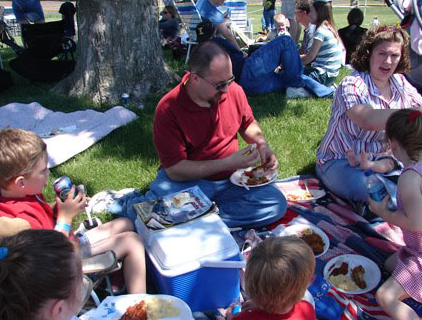In theory we think it fair to justify all processes on the basis of the total process, not just part of it, financially or otherwise. An external cost is one that somebody else pays, so it may be considered a subsidy. An example is a picnic in a park. If picnickers leave messes for the park staff to clean up, from their view they externalize a cost of the picnic to the park staff. From the view of the park staff, the cost of clean up is externalized if picnickers clean up messes. Smaller staffs equate to smaller budgets.
But if nobody cleans up, the cost of the picnic is externalized to nature, which will biodegrade the mess at its own rate. This being slow, soon no one will want to picnic in a trashy park.
Picnickers voluntarily cleaning up is an example of social capital, people trusting each other to do their part on processes valued in common, and a park is a public commons. Regardless of worldview most of us share a few common social expectations, like cleaning up in a park, supporting volunteer fire departments, and so on.
As processes in common become more remote they become more contentious; for example, taxes for common services. We squabble over public spending and can’t agree on fair taxation. If we think others are externalizing costs they should bear, we dislike subsidizing anything from school lunches to factory buildings. When common services like parks are local and visible, service to them seems less onerous.
But the external costs least visible financially are absorbed by nature. For example, we take for granted that soil will purify our wastes until after it is too contaminated to perform that function. Commercial tunnel vision drives competitors toward externalizing costs to nature. For example, if a fracking company pays dearly to remediate spent fracking fluids while competitors merely hope that the stuff disappears in holding ponds, that cost disadvantage induces disregard for the common good.
Unfortunately, nature does not send invoices or report costs in dollars. Grasping the need to care for nature is more a relationship thing than a financial transaction. A community learning how to live better while using less starts becoming a community of sharing, and sharing requires a bond of trust, hard to build up and easy to break.
A community that is making itself more resilient has to develop trust in itself as a self-governing learning organization, and that takes time if that kind of culture is not already present. But the most difficult transition is likely to be with companies that fear getting off the growth bandwagon, and entering a learning exchange with customers that are trying to improve processes important to them. In other words, the business model has to shift from selling more “stuff” to buyers to a service model helping customers learn how to do better with less. That usually makes little sense without thinking about it for a while, but it’s huge.

